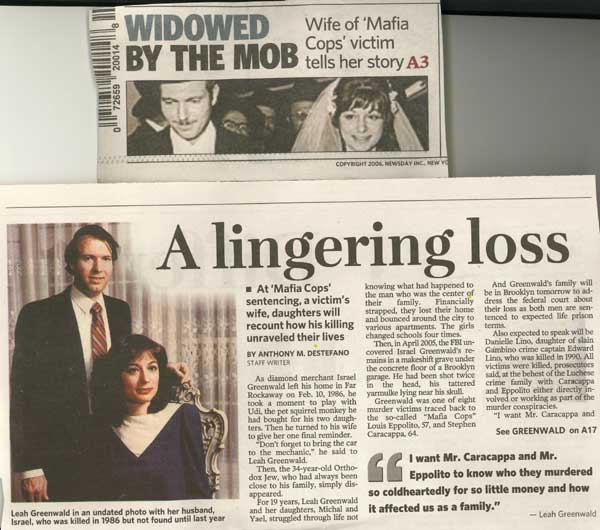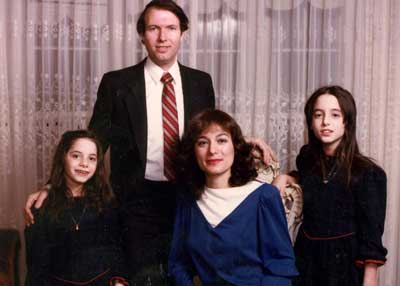Newsday Staff Writer
June 4, 2006
As diamond merchant Israel Greenwald left his home in Far Rockaway on Feb. 10, 1986, he took a moment to play with Udi, the pet squirrel monkey he had bought for his two daughters. Then he turned to his wife to give her one final reminder.
“Don’t forget to bring the car to the mechanic,” he said to Leah Greenwald.
Then, the 34-year-old Orthodox Jew, who had always been close to his family, simply disappeared.
For 19 years, Leah Greenwald and her daughters, Michal and Yael, struggled through life not knowing what had happened to the man who was the center of their family. Financially strapped, they lost their home and bounced around the city to various apartments. The girls changed schools four times.
Then, in April 2005, the FBI uncovered Israel Greenwald’s remains in a makeshift grave under the concrete floor of a Brooklyn garage. He had been shot twice in the head, his tattered yarmulke lying near his skull.
Greenwald was one of eight murder victims traced back to the so-called “Mafia Cops” Louis Eppolito, 57, and Stephen Caracappa, 64.
And Greenwald’s family will be in Brooklyn Monday to address the federal court about their loss as both men are sentenced to expected life prison terms.
Also expected to speak will be Danielle Lino, daughter of slain Gambino crime captain Edward Lino, who was killed in 1990. All victims were killed, prosecutors said, at the behest of the Luchese crime family with Caracappa and Eppolito either directly involved or working as part of the murder conspiracies.
“I want Mr. Caracappa and Mr. Eppolito to know who they murdered so coldheartedly for so little money and how it affected us as a family,” said Leah Greenwald, 51, in a telephone interview with Newsday.
According to court testimony, Israel Greenwald was slain because he knew about a scheme to cash a stolen bond, and mobsters and their associates feared he would talk to the FBI. But as Leah Greenwald recalled it, her husband didn’t know any mobsters and took the bond to Europe during a business trip for what he thought was a legitimate attempt by a friend to cash the financial instrument. After realizing the bond was not legitimate, he tried to persuade the friend to tell the FBI about the bond scheme, she said, something that apparently got back to those involved in the scam.One agent testified that Israel Greenwald told her he didn’t know the bond was stolen.
“You can’t describe in words what we feel and what we have gone through,” Leah Greenwald said about the struggles her husband’s disappearance caused.
But the emotions she and her daughters feel are contained in emotional victim impact statements filed in federal court.
“My daughters lost a father at a very fragile age, and they lost a mother too. They came home from school and I wasn’t there for them,” wrote Leah Greenwald about her efforts during the years to work and raise her daughters as a single mother.
“I couldn’t date and move on,” she wrote. “I was psychologically damaged for a relationship. I buried myself in work and used the excuse that I had to survive and pay bills.”
“As a child, I never felt normal,” wrote daughter Michal Greenwald, now 30. “I was unique in that I had no clear answer as to what happened to my father. … I blamed it all on my mother, for who else was there to take the brunt of my anger and pain?”
Yael Greenwald, now 28, wrote that as a child other children would whisper the Yiddish word “nebach” — for charity case — when she passed by because of her family’s financial straits.
After being unable for years to give Israel Greenwald a proper burial, his wife and daughters finally took his remains to Israel. Monday they seek to continue the act of closure.


